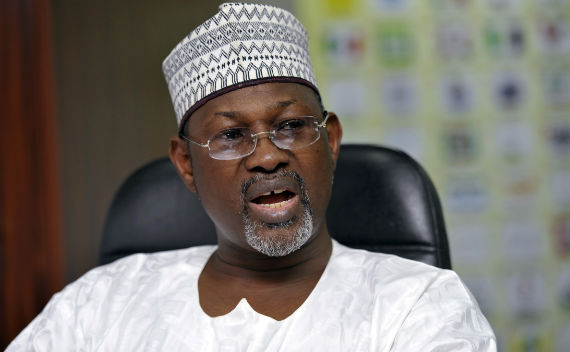The Independent National Electoral Commission on Monday blamed the ambiguity created by the Electoral Act for its inability to enforce the rules regarding the processes on how candidates for elections could emerge.
The Chairman of INEC, Prof. Attahiru Jega, stated this while speaking at the INEC/Traditional Rulers’ National Summit on Peaceful Elections in Abuja.
Jega pointedly stated that the inability of the National Assembly to conclude work on the amendment of the Electoral Act, created a lacuna that the political parties are exploiting, which is a constraint to the commission.
In the words of Jega: “There is an existing provision in the Electoral Act, which actually creates confusion and conflict, constraining what INEC does in terms of regulating and ensuring internal party democracy.
“For example, Section 31 of the Electoral Act says that when a party does primaries and submits the names to INEC, INEC will not reject those names for any reason whatsoever.
“There is also section 87 of the same Electoral Act which says that candidates in political party primaries should emerge through democratic processes.
“Now, both the Electoral Act and the constitution mandated INEC to monitor primaries of political parties.”
The INEC Chairman however noted with regret that each time the parties are conducting primaries and INEC officials sends its officials to monitor and prepare reports in compliance with the Electoral Act and the provisions of the 1999 Nigerian Constitution (as amended), the names the parties’ secretariats submit as candidates were different from the report of the INEC officials.
According to him: “In 2011, we had situations when we will send monitors that return with reports, detailing who emerged in the party primaries through democratic means in accordance with the dictates of Electoral Act, but the names that the party secretariats forward as nominations to INEC were totally different.
“Some of them, for example, would ignore the candidate that emerged and picked the candidate who finished third.
“There are cases they would even ignore the entire list and send an entirely different person who did not participate in the party primaries.
“Of course, a provision in that Electoral Act created that ambiguity and confusion and there is nothing we could do other than to accept whatever names they gave to us to avoid them accusing us of interfering with the internal affairs of the political parties or violating the provisions of the Electoral Act.”
Prof. Jega pointed out that the Commission has made recommendations, since two years ago, to the National Assembly for the amendment of this particular provision so as to improve the process and ensure that parties comply with the rules and expressed the hope that they should be attended to.
He expressed confidence that the prospects of having good election in 2015 are very bright.
Trending
- Lagos taskforce arrests, prosecutes 12 suspected land grabbers in Alausa
- Governor Adeleke engages 10,000 for Imole Youth Corps, says 250, 000 jobs created last two years
- Governor Okpebholo receives NULGE officials, assures of fruitful collaboration
- Nigeria’s Tax Reform Bill: A step towards economic transformation, by Abdullahi Hashim
- Kemi Badenoch unveils stricter UK immigration rules, seeks 15-year wait for citizenship + Video
- Gov. Okpebholo’s unshaken drive to recover Edo’s stolen assets, by Fred Itua
- NiDCOM boss celebrates Akinwunmi Adesina as he marks yet another birthday
- Abia governor signs security trust fund bill into law


